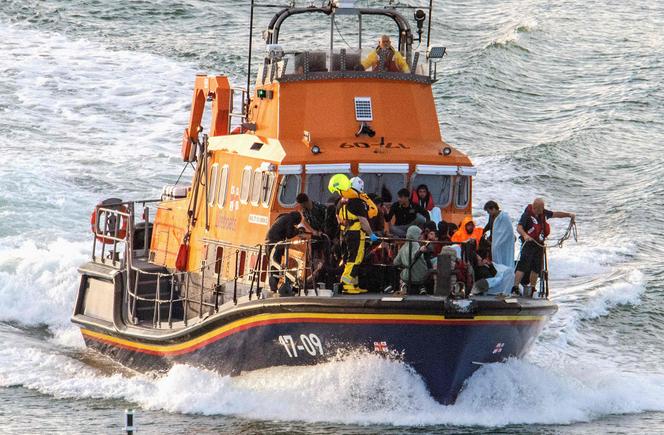


Last week was declared "small boats week" by the British government, which wanted to demonstrate its efforts to put an end to migrants crossing the English Channel in inflatable boats. It turned into a fiasco.
It began on Tuesday, August 8, with the provocation by Conservative Party deputy chairman Lee Anderson, who declared that migrants could "fuck off back to France" if they didn't like the conditions offered in the UK. It ended on Saturday, August 12 with the sinking off Sangatte in the English Channel of a boat carrying 65 migrants. Six Afghans drowned. In between, taking advantage of the fine weather, 1,600 migrants arrived on English shores between August 10 and 12, a record for the year, possibly breaching the symbolic limit of 100,000 migrants crossing the English Channel since 2018. Small boat week was a "catalogue of chaos" for the Tories, said Stephen Kinnock, a Labour MP specializing in migration issues.
Since 2014, the port of Calais and the Eurotunnel entrance have gradually been made inaccessible. Under pressure from the British authorities, France has stepped up patrols and installed barbed wire, infrared cameras, surveillance cameras, CO₂ detectors and so on. Migrants have shifted to crossing by sea, usually aboard large inflatable boats. There were 300 in 2018, 2,000 in 2019, 8,500 in 2020, 28,500 in 2021 and 45,700 in 2022. This year, nearly 16,700 have already been detected, down around 15% on the same period last year. The majority come from war-torn countries (Afghanistan, Syria, Iraq), but unexpected groupings sometimes emerge – in the summer of 2022, Albanians briefly accounted for more than a third of arrivals.
This very spectacular influx, with its regular tragedies, is causing a latent political crisis in the UK. Among his five goals for his term of office, Prime Minister Rishi Sunak promised to "stop the boats."
He is counting on a very tough policy to achieve this. He has pushed through a new law, finally approved by Parliament on July 20, which bans all asylum applications from people who have entered the UK illegally. "When people know that if they come here illegally, they won't get to stay – they stop coming," Sunak claimed in June. His government announced that anyone who enters illegally will be "detained and removed in weeks – either to their own country or to a safe third country."
At the heart of the program is an agreement with Rwanda, where the migrants are theoretically to be deported and their cases processed. Announced with great fanfare in April 2022, the agreement with Kigali has been blocked by the British courts. In June, the High Court noted that deportation can only take place to a "safe country," and ruled that Rwanda did not qualify. The government has appealed, and the Supreme Court is due to rule in the autumn.
You have 51.13% of this article left to read. The rest is for subscribers only.
